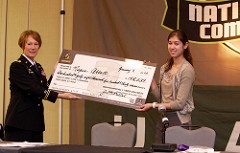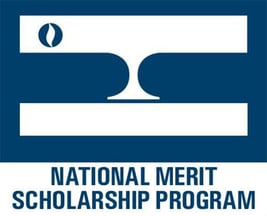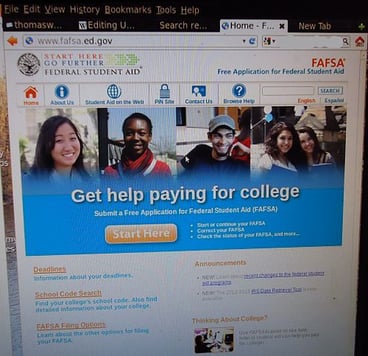
We know that the cost of a college education can seem out of reach for many students. Luckily, there are a number of ways you can reduce the price of your degree, from grants and work-study to student loans. Even better, if you’re an exemplary student, you’ll likely qualify for one or more merit-based scholarships, which are a great way to offset tuition, fees, room, and board.
In this post, we’ll discuss what merit scholarships are and provide a list of the top merit aid programs. We’ll also share our expert recommendations on how to apply so you can maximize your chances of graduating with minimal to no debt. Let’s get started!
What Is a Merit-Based Scholarship?
A merit-based scholarship, alternatively called a merit scholarship, is free money that discounts the cost of college. Whereas need-based scholarships are awarded according to a student’s ability to pay for school, merit-based scholarships recognize distinguished performance in one or more areas, including academics, artistic ability, athletic talent, community service, and leadership in extracurricular activities. Several merit scholarship programs take financial need into account.
Some merit scholarships are one-time prizes. But the most competitive, most generous merit scholarships, which are awarded to students who demonstrate outstanding achievement in multiple areas, are renewable throughout your college career.

Types of Merit Scholarships
Merit-based scholarships can generally be divided into two categories: those awarded by colleges and universities and those offered by public and private organizations.
Many schools will consider you automatically for merit scholarships when you apply for admission. But not all schools offer merit-based aid. For example, Ivy League colleges and many other prestigious institutions offer only need-based awards.
Merit scholarship programs hosted by external organizations generally require a separate application, which may include one or more essays, recommendation letters, and other evidence of your exemplary performance. These awards are available from community groups, religious institutions, and civic organizations as well as philanthropic associations, honor societies, and private companies. The federal government does not offer merit scholarships, but many state and local governments do.
How to Find College Merit Scholarships
Most schools advertise their merit scholarships on their institutional websites. You’ll likely find this information on their admissions, financial aid, and scholarship pages, where you can find details about eligibility requirements and application directions. For more specific awards, we also recommend looking up the university’s pages for specific majors, offices of community or civic engagement, athletics, and the arts.
You can also locate a specific college’s merit scholarships by searching online for [school name] merit scholarship.
Your assigned admissions counselor at the university is another terrific resource. Once they know more about your interests and skill sets, they can provide you with more information about opportunities that will best fit your achievements.

The Top Merit Scholarships from External Sources
To locate merit scholarships offered by external organizations, try searching online for the phrase merit scholarships paired with the specific interest or activity in which you excel, such as community service merit scholarships or writing merit scholarships. You can also consult our insider’s guide on the best available scholarship databases and search tools.
But if you’re looking for the top merit scholarships available, start with the following list.
National Merit Scholarship
Since 1955, the National Merit Scholarship Program has issued financial awards to U.S. citizens or permanent residents in high school who take the Preliminary SAT/National Merit Scholarship Qualifying Test (PSAT/NMSQT) in their junior year or earlier. Among high scorers, approximately 16,000 are selected as semifinalists, and 15,000 become finalists after meeting specific academic and other qualifications. Ultimately, 800 finalists receive Special Scholarships from the National Merit Scholarship Corporation’s (NMSC’s) corporate partners, whereas 7,250 finalists will win one of three types of awards: a one-time $2,500 National Merit Scholarship from the NMSC, a corporate-sponsored scholarship, or a college-sponsored scholarship.
National Merit Scholarships are prestigious awards, so check out our expert guide on how to prepare for the lengthy scholarship application process.

Coca-Cola Scholars Foundation Program
The Coca-Cola Scholars Foundation awards a $20,000 merit prize each year to 150 high school seniors who are not the children or grandchildren of current or former Coca-Cola employees. The scholarship recognizes students who have earned at least a 3.0 GPA, demonstrate leadership, and possess a passion for school and community service as well as social justice. The selection process comprises multiple stages, including essays at the semifinal stage and interviews if you’re selected as a finalist.
The annual deadline for the award is usually around Halloween. Our insider’s guide on the Coke Scholarship provides more detail about this opportunity and how to apply.
Cameron Impact Scholarship
A four-year merit award covering full tuition, fees, and books at any accredited U.S. college or university, the Cameron Impact Scholarship recognizes up to 15 high school students each year for exemplary academics (i.e., at least a 3.7 cumulative GPA), extracurricular participation, leadership, and community service. To be eligible, you must demonstrate a commitment to having a direct positive impact on your local and global community in and after college. Early applications are due in May; regular applications are due in September.
The Barry Goldwater Scholarship
If you’re interested in pursuing a career in STEM, the Barry Goldwater Scholarship provides up to $7,500 to college sophomores and juniors who are U.S. citizens, have at least a 3.0 GPA, and intend to pursue graduate-level research in the natural sciences, engineering, or mathematics. The multistage scholarship application involves being nominated by a Goldwater campus representative and requires several components, including a profile and pre-application, a questionnaire, a research essay, recommendation letters, and transcripts. The deadline for being nominated is the last Friday each January.

The Carson Scholars Fund
Each year, the Carson Scholars Fund selects students in grades 4–11 who demonstrate academic excellence and a passion for community service to receive $1,000. To be eligible, you must have a minimum 3.75 GPA. However, you cannot apply directly; you must first be nominated by an educator at your school, and there can be only one nominee from each school per year.
Applications include an information form, teacher recommendation letters, evidence of community service, and an essay. Nominations open in mid-October and close in mid-December each year; applications are due in mid-January.
The Equitable Excellence Scholarship
Recognizing leadership, determination, and resilience, the Equitable Foundation awards $5,000 scholarships, renewable for up to four years, to 100 students per year. They also offer one-time scholarships of $2,500 to another 100 students each year. These scholarships are intended to cover tuition, room, board, and books.
The organization additionally provides scholars with mentoring and networking opportunities as well as professional development.
The program has additional benefits for those affiliated with the recipients. For example, your high school will receive a $500 grant whether you win a renewable or one-time scholarship. And if you attend a public school, you can choose an educator who has made a difference in your life to receive a $500 gift card.
To be eligible, you must be a U.S. citizen or legal resident. The application includes an essay in which you’re asked to describe how you demonstrate courage in pursuing what’s possible, strength in overcoming obstacles, and wisdom that you share with others. You can begin submitting applications in October; the deadline is in mid-December.
 As an Equitable Excellence scholar, you can award an educator with a $500 gift card from the organization.
As an Equitable Excellence scholar, you can award an educator with a $500 gift card from the organization.
Davidson Institute Fellows Scholarships
The Davidson Institute is a nonprofit that serves profoundly gifted students who have scored in the 99.9th percentile on IQ and achievement tests. Each year, it awards $10,000, $25,000, and $50,000 to high-achieving students who have completed a substantial piece of work—defined as an idea, project, discovery, performance, or other accomplishment that experts would acknowledge as meaningful and exhibiting the potential to make a positive difference in the local or global community. Work in the visual arts does not qualify, but contributions in science, technology, engineering, math, literature, philosophy, music, or an out-of-the-box discipline are eligible.
Applicants can apply in teams, but both team members must meet the requirements. You must be a U.S. citizen or permanent resident who is 18 years old or younger as of the application deadline, but there is no minimum age for eligibility. The application process does require nomination by at least two people, and the deadline is mid-February.
National Honor Society Scholarships
If you are a high-achieving student who has already demonstrated scholarship, a dedication to community service, leadership, and character, chances are that you have been inducted into the National Honor Society (NHS) chapter at your school. If you are a senior and an active member of your NHS chapter, you may be eligible to apply for a nonrenewable merit scholarship from the NHS.
In 2023, 575 semifinalists will receive $3,200 while 24 national finalists will be awarded $5,625 and 1 national finalist will receive $25,000. National finalists also receive an all-expenses-paid trip to Washington, DC, for a weeklong scholarship event focused on leadership.
The deadline is in late November or early December each year.
Merit Scholarships That Are Also Need Based
As mentioned above, several top-tier scholarship programs also take a student’s financial need into consideration when awarding merit aid. Here are a few of the most prestigious, generous scholarship programs that are both merit and need based.

The Jack Kent Cooke Foundation College Scholarship
The highly selective Cooke College Scholarship Program awards up to $55,000—as well as college-prep advising and networking opportunities—to high school seniors with financial need (defined as having a family annual gross income below $95,000) who have earned at least a 3.5 GPA and are intending to attend a four-year college or university. To qualify, you must also demonstrate that you are a positive role model to others, a leader in community service, and a goal-oriented individual who adapts well to change and remains resilient in the face of challenges.
To apply, you’ll need to submit the Common App, adding the Jack Kent Cooke Foundation as one of your schools. You’ll then be asked to submit several short essays, a list of your extracurricular activities, your awards and honors, your intended major, your financial information, and two letters of recommendation. One recommendation must be written by an 11th-grade teacher in a core subject (i.e., English, math, social studies, science, or a foreign language).
Applications open in late August, and the deadline occurs in mid-November.
The Ronald McDonald House Charities Scholarship
Each year, the 322 Ronald McDonald House Charities (RMHC) across the country award scholarships to high school seniors who are U.S. residents, are younger than 21, have demonstrated solid academic achievement (a minimum 2.7 GPA), have financial need, and who live near a participating RMHC chapter.
RMHC scholarships start at $1,000 but can be as large as $100,000. They can be applied to tuition, fees, books, and supplies. The application deadline is usually in January each year.
Each chapter has their own eligibility criteria and may offer more than one type of scholarships, so it’s best to research your local chapter’s requirements.
The GE–Reagan Foundation Scholarship
Each year, General Electric partners with the Ronald Reagan Presidential Foundation and Institute to select high school seniors who are U.S. citizens with at least a 3.0 GPA to receive a $10,000 scholarship that’s renewable for up to three additional years (i.e., for a total of up to $40,000).
To be eligible, you must demonstrate distinguished leadership, ambition, motivation, reliability, and integrity. You must also provide evidence of your commitment to civic engagement and pride within your school and place of employment.
In addition to receiving a substantial financial award, recipients also attend an all-expenses retreat in California and enjoy leadership support throughout their college careers. The deadline is usually in early January of each year.

The Elks National Foundation Most Valuable Student Scholarship
Awarded to 500 high school seniors each year, the Elks National Foundation Most Valuable Student Scholarship recognizes college-bound students who demonstrate distinguished academic achievement, community service, and leadership as well as financial need. Most recipients are awarded $1,000 per year for a total of $4,000 over their college career. But 20 finalists are selected to participate in a weekend of interviews to compete for awards ranging from $5,000 per year (a total of $20,000) to $12,500 per year (a total of $50,000).
To be eligible, you must be a U.S. citizen and submit an application, an essay, and financial information. The deadline is usually in mid-November. You do not need to be a member or related to a member of the Elks Foundation to qualify.
The Elks Foundation hosts numerous other scholarship programs at the local, district, and state levels as well, so research lodges in your area to see whether you are eligible for these awards. Just be aware that you cannot combine different scholarships from the organization.
The Gates Scholarship
The Gates Scholarship recognizes 300 exemplary high school seniors every year who demonstrate outstanding leadership in extracurricular activities and/or community service. To be eligible, you must be African American, American Indian, Asian American, Pacific Islander American, and/or Hispanic American; have a minimum cumulative GPA of 3.3; and be in the top 10% of your graduating class.
The award covers any cost of attendance not already covered by other scholarships, financial aid, and your family’s contribution as determined by the Free Application for Federal Student Aid (FAFSA) for up to five years. It also provides a range of other services, including academic support, mentoring, and financial literacy training. The deadline is usually in mid-September.

The Burger King Scholars Program
Established in 2005, the Burger King General Track Scholarship recognizes academic excellence; active leadership in community service, athletics, and/or extracurricular activities; work experience; and financial need. You must be a citizen of the U.S. or Canada living in the U.S., Puerto Rico, Guam, or Canada and a high school senior with at least a 2.0 GPA and to qualify. The Burger King Foundation also offers scholarships to employees and family members of employees of the company.
The eligibility requirements for the more competitive James W. McLamore Whopper Scholarship are similar to those for the General Track Scholarship except that the minimum GPA is 3.5. The General Track Scholarships start at $1,000; the McLamore Whopper award is up to $50,000. The annual deadline for all Burger King Foundation awards is usually in mid-December.
The QuestBridge Match Scholarship
The nonprofit QuestBridge partners with premier colleges to help academically gifted high school juniors and seniors from low-income families prepare for and afford a top-notch college education. The organization’s long list of partner institutions include Yale, Columbia, CalTech, MIT, Dartmouth College, Rice University, and Williams College. Students who will graduate from high school in the summer of the current academic year and enroll at a partner university in the fall of the same year can apply for a QuestBridge Match Scholarship as part of the organization’s National College Match program.
If you are selected as a finalist and match with one of QuestBridge’s partner universities, you will be granted early admission as well as a full four-year scholarship totaling more than $200,000. The award covers tuition, fees, room, board, books, supplies, and travel expenses. If you win a Match Scholarship, you’ll have no student loans, and your parents won’t have to contribute to paying for your college education, but you may be expected to contribute through Federal Work-Study, summer employment, or savings.
If you do not match with one of your top-ranked schools, you can still apply for a QuestBridge scholarship but with regular decision at any number of their partner institutions. If selected, you’ll have 100% of your demonstrated financial need covered.
Although QuestBridge has no specific cutoffs, eligibility depends on academic excellence (e.g., grades, the rigor of your coursework, class rank, test scores if you have them, and demonstrated writing ability) and financial need. They also consider your personal circumstances, which range from honors, awards, and extracurricular activities to your home or family responsibilities, parents’ level of education, character, and motivation. Applications open in late summer and are usually due by late September.

How to Increase Your Chances of Earning a Merit Scholarship
Even if you’re applying to merit scholarships that focus on specific niches, you’ll stand out from other candidates if you excel in multiple areas of your application. You’ll also be eligible for a greater number of aid programs if you have a well-rounded profile. Here are the broader ways you can set yourself apart from other applicants.
Distinguish Yourself Academically
You can demonstrate academic distinction by achieving high grades in specific core subjects, maintaining a high cumulative GPA, and graduating at a specific class rank (e.g., top 10% or even 5% of your class). In addition to grades, you’ll want to make sure that you’re enrolling in as many rigorous courses as possible, such as honors, AP, and/or IB classes, if they’re offered at your high school.
Another way to earn merit scholarships based on academic performance is by earning excellent standardized test scores, which will demonstrate your readiness for college coursework.
Cultivate Specific Skill Sets
Whether your talents lie in the arts, in athletics, or in extracurriculars, honing your skills in specific areas is crucial if you’re going to qualify for a scholarship. If you are a musician, for example, that means practicing your instrument diligently, taking lessons (if you can afford them), performing in concerts and recitals, and participating in mock auditions. Athletic scholarships require similar dedication: you’ll need to attend practice, work with your coach to improve your performance, and win trophies in individual and/or group competitions.
Try not to spread yourself too thin; focusing on one or two specific areas leads to the kind of mastery that is more likely to win you a merit scholarship than merely participating in or exhibiting average performance in numerous activities.

Demonstrate Leadership
Evidence of strong leadership skills or potential comes from serving as an officer, as a team captain, or in another important role in one or more extracurricular activities, from student organizations, sports, and honor societies to community groups and jobs. You’ll need to go beyond simply serving in the position. You’ll also need to achieve specific results and have a measurable impact (e.g., raising $2,000 for a local charity or leading your team to the state championships) to set yourself apart from other scholarship candidates.
You can also demonstrate initiative by starting and running your own student organization.
Volunteer in Your Community
Whether it’s through a student group at your high school, through a member organization (e.g., the Girl Scouts of the USA or Navigators USA), or as an individual, showing authentic dedication to community service is an important part of building your résumé as a scholarship applicant. Volunteering has many benefits beyond merit aid eligibility: you can build leadership skills, broaden your social network, and, perhaps most importantly, make a difference in the lives of others.
Just make sure you’re volunteering regularly and consistently; attending one or two National Honor Society community service events will not be sufficient to capture a scholarship committee’s attention.
Develop Strong Mentoring Relationships
Most scholarship applications require one and usually more recommendation letters. So you’ll need to build trusting, respectful relationships with mentors at your school and in your community who know you well (i.e., for at least two years) and can speak to your abilities and potential. These might include specific teachers, coaches, high school counselors, extracurricular advisors, job supervisors, or members of your church or community organizations.

Practical Tips for Getting a Merit Scholarship
You’ve worked hard on your grades and test scores and served as a leader in your extracurricular activities and community service. Good work—you’ve distinguished yourself as an ideal candidate for a merit scholarship! Now, here are some tips for applying.
Start Applying Early
Merit scholarships usually require substantial time and effort when it comes to compiling your application materials, writing essays, and requesting recommendation letters from teachers and other trusted mentors. So make sure you start putting together your applications well before their deadlines. We recommend beginning the scholarship application process four months in advance of the earliest deadlines.
Stay organized
Keep a spreadsheet of the names and deadlines for every scholarship opportunity you’re applying to. You’ll likely want to organize this list with earliest due dates first so that you don’t miss them.
Additionally, include a checklist of required application materials for each program. This will help you keep track of recommendation letters you’ve requested and any documents you might still be missing and need to submit.

Adhere to the Directions
Whether you’re applying for merit scholarships offered by colleges and universities or those sponsored by external organizations, read the application instructions carefully so that you know precisely what their criteria are. Take careful note of required formats for documents, how and where you’re supposed to submit them, and exact essay prompts. You don’t want to disqualify yourself simply by not filling out a form properly, not answering the stated essay questions, or not sending in your materials on time.
Consider Whether the Effort is Worth It
Some merit scholarships require significant effort but provide comparatively small rewards (e.g., $100–$200). Other scholarship funds are generous but also highly competitive, demanding an immense investment on your part to apply.
Carefully weigh whether these scholarship programs are truly worthwhile. For example, only larger financial awards (e.g., $500 or more) might be valuable enough to justify the time and effort required to apply. You may also want to consult with your high school counselor, teachers, and adult family members whether it makes sense to apply for the most selective scholarships if you just barely meet the qualifications.
And if you don’t meet all of a scholarship’s basic eligibility requirements, don’t waste your time applying. Instead, devote your time exclusively to applying for merit aid you actually qualify for.
Request Nominations and Recommendations as Soon as Possible
Remember that before you can apply to some of the above merit-based scholarships, you will need to be nominated by an educator or professional who knows you well and can authentically and enthusiastically describe your achievements and potential. Almost all merit award applications require reference letters by mentors.
Be sure to request nominations and recommendations at least one month before your deadlines. If you can ask even earlier, your references will appreciate the extra time. Our insider’s guide to asking for letters of recommendation provides more useful suggestions for handling this part of your scholarship application.

Ask for Feedback
Always seek out constructive criticism from teachers, counselors, and mentors on your scholarship documents—especially your essays. This is the reason for beginning the application process early: you’ll need at least a few weeks, if not a solid month or more, to provide your teachers, tutors, counselors, or family members enough time to review your materials and provide their feedback. It’s also best to give yourself several days to apply their suggestions.
If the scholarships you’re applying for require interviews at the semifinal or final stages, talk to your high school counselor, trusted teachers, and/or other mentors about participating in one or more mock interviews. Interviews can be anxiety provoking even for the most high-achieving students, but a practice interview provides you with the space to test out and improve your interview skills while figuring out how to express why you are the ideal candidate for a given merit award.
Apply for a Range of Merit Awards
Similar to applying to safety, match, and reach colleges and universities, you’ll want to apply to a variety of scholarship programs. Look for merit awards that vary in terms of their source (e.g., schools as well as national, regional, state, and community organizations), competitiveness, award amount, and eligibility criteria—as long as you fulfill every basic requirement.
For example, if you are an all-A student in the top 10% of your graduating class who also volunteers weekly at the county animal shelter and plays first chair in the marching band, consider applying for academic, community service, and music scholarships—or awards that recognize students who excel in multiple areas, such as those listed earlier in this article. Applying broadly will maximize your chances of winning one or more merit-based scholarships.
Good luck!
What’s Next?
Aiming to cover all your college costs with a single award? Check out our expert guide on how to land a full-ride scholarship.
Earning a perfect score on a standardized test is just one excellent way of qualifying for a merit scholarship. Learn how you can ace the ACT or achieve a 1600 on the SAT.
Are you a vegetarian, a Trekkie, or a future grocer? Then there’s a scholarship out there for you—and for almost any other imaginable niche! Here’s our comprehensive list of weird scholarships.

Want to build the best possible college application?
We can help. PrepScholar Admissions is the world’s best admissions consulting service. We combine world-class admissions counselors with our data-driven, proprietary admissions strategies. We’ve overseen thousands of students get into their top choice schools, from state colleges to the Ivy League.
We know what kinds of students colleges want to admit. We want to get you admitted to your dream schools.
Learn more about PrepScholar Admissions to maximize your chance of getting in.

Source: blog.prepscholar.com